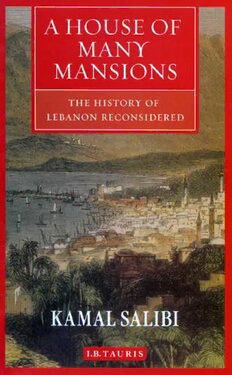
A House of Many Mansions PDF
256 Pages·1988·9.735 MB·English
Most books are stored in the elastic cloud where traffic is expensive. For this reason, we have a limit on daily download.
Preview A House of Many Mansions
Description:
Today Lebanon is one of the world's most divided countries - if it remains a country at all. But paradoxically the faction-ridden Lebanese, both Christians and Muslims, have never shown a keener consciousness of common identity. How can this be? The Lebanese historian Kamal S. Salibi examines, in the light of modern scholarship, the historical myths on which his country's warring communities have based their conflicting visions of the Lebanese nation. The Lebanese have always lacked a common vision of their past. From the beginning Muslims and Christians have disagreed fundamentally over their country's historical legitimacy: Christians on the whole have affirmed it, Muslims have tended to emphasize Lebanon's place in a broader Arab history. Both groups have used nationalist ideas in a destructive game, which at a deeper level involves archaic loyalties and tribal rivalries. But Lebanon cannot afford these conflicting visions if it is to develop and maintain a sense of political community. In the course of his lively exposition, Salibi offers a major reinterpretation of Lebanese history and provides insights into the dynamic of Lebanon's recent conflict. He also gives an account of how the images of communities which underlie modern nationalism are created.
See more
The list of books you might like
Most books are stored in the elastic cloud where traffic is expensive. For this reason, we have a limit on daily download.
